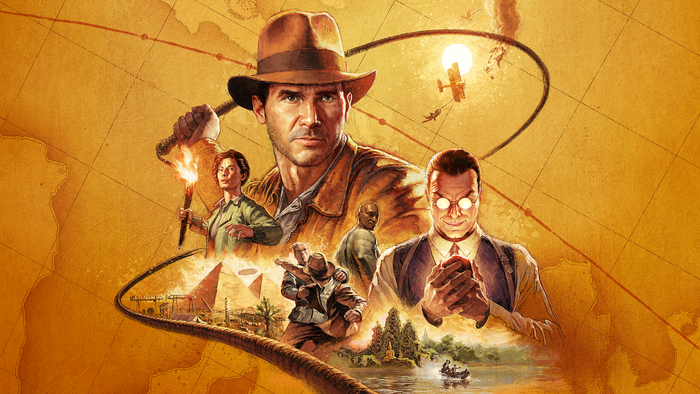State of the Industry 2020 & Beyond with Brad Hart and Johan Karlsson | Game Dev Unchained
Brad Hart is a Chief Technology Officer & Johan Karlsson is a Senior Consultant at Perforce. We interviewed both Brad and Johan to talk about the recent survey Perforce conducted about the State of the industry with effects of COVID.

(This is an interview conducted on the Game Dev Unchained podcast, an audio podcast that has been transcribed into written form. Please forgive and assume anything written that seems off to be completely my fault and not of the guest. Thank you!)
“One of the things we’ve seen with our customers in the game development world, both big and small companies is remote work. People were concerned about how they were going to do their work outside a physical office setting. However, remote working is here to stay.”
— BRAD HART (CTO OF PERFORCE)
Introduction
Brad Hart is a Chief Technology Officer & Johan Karlsson is a Senior Consultant at Perforce. We interviewed both Brad and Johan to talk about the recent survey Perforce conducted about the State of the industry that primarily deals with the effects of the Pandemic on game development for 2020 and beyond.
Be sure to check out the full survey that we referenced throughout this interview here.
What is the Future of Game Dev in the 2020s
Johan: The CoVID-19 situation has impacted the game industry in quite a few different ways.
One aspect that has changed is from a perspective of a tool vendor. The need for using tools to distribute among teams. Then what we did recently was asking ourselves “What does this mean for our customers?” Because we serve game developers all around the world? We did a survey and asked about five-hundred game developers, essentially, how is game development changed forever? One of the key answers was that there is more power. Game Developers can actually work remotely, we can actually work well with distributed teams and the technologies are there now to enable better communication. How can we do this? There's Zoom meetings. There's a good backlog of tools. There's good version control softwares where you can move assets around very quickly, and so forth.
So I think we're seeing implications both in terms of how people organize their production sequence. Lastly, of course, what it means for building games for the players. What does this mean for real sports, where people can’t physically participate at stadiums or public gatherings. This results in the rise of things like E-Sports and games that are focused on that.
Pushing the Limits of Constant Online Connectivity

Brad: One of the things we've seen with our customers in the game development world, both big and small companies is remote work. People were concerned about how they were going to do their work outside a physical office setting. However, remote working is here to stay.
From a development perspective, there were many customers moving massive data, massive server farms into the cloud. With a big project, this kind of pushed data over the edge and that's putting crazy limits on bandwidth. These things are going to roll across the globe and people are just trying to do their job, not just play a game, but trying to do their work and they're dealing with bandwidth issues where things are being capped.That's really painful for people. Actually, trying to put food on their table, let alone just trying to enjoy themselves on a Friday night and play some games and have some fun. So it's a challenge, right? But we really have seen that trend is rocket lit and taking off. Everything is going into the cloud where traditionally IP was always kept locally. People are putting it up there to give access to workers globally.
One of our best customers just built a system where the entire game development environment, everything they need, is running on a server in the cloud. Then people will just use a terminal window to do their work, which helps alleviate some of that.
We're dealing with the bandwidth issues at home now. It's a challenge and I think everybody wants to look like a hero, where these companies. like internet providers, at the beginning of CoVID said ‘Hey, look, we're going to give you more internet data for free. We're going to remove limits and all that.” But, it always comes back to business. And if they can get it, they'll take it.
Challenges and Benefits with Remote Working

Johan: I can just first start by sharing a personal anecdote. I was scheduled to do training in Florida in late March and we had a meeting about when this whole thing broke out, at the end of February. We were discussing pushing this talk to June. Because we all had a mindset that this is probably going to be something that's going to be over in a couple of months because it's unthinkable to shut down economies and lock them down in their homes for a long period of time.
And I can tell you that training still hasn't happened yet, but we could start doing things online very quickly. I think that is something that will resonate through the research we've done is that many things that were deemed to be impossible, quote, unquote, have always been about a studio where everyone is there physically. In the studio, you have to come in and we got our stationary PC's provided and are told to work behind it.
Through the heroes in many IT departments that essentially changed overnight, there was a brute force change on a whole view on innovation. That's one the challenges several have raised here of the people that we surveyed. How do you remain innovative as a game studio if you're not able to have face to face conversations in chat, and try gameplay mechanics or things like that?
One thing is technology works! Working remotely and distributing data in the cloud, works. There are many challenges about that, but for an innovative industry like the game dev industry, how do we remain innovative? How do we do our physical whiteboards? Do we need to put that on a digital whiteboard, instead, with common goals and so forth? How do we do things like daily standups or early game testing? Can we get feedback like we used to? The collaboration part, the things that are removed when you're not together as a team, has been one type of challenge. But then there's also been some benefits in terms of how this might help include more people.
In a game studio, how can this improve inclusivity? People who cannot make it to a game studio everyday, like having children or living far away, now there’s an opportunity to on board new team members anywhere in the world essentially. There’s not only problems with the whole situation here, there's also opportunities. For some of these games studios, they are seeing a bigger revenue stream because more people are at home playing more games. For this specific industry, or some parts of it, has not had an enormous business impact. Overall, it’s a very sad situation of course, but there are definitely studios who are trying to make the best out of it. That's what we're learning.
Brad: This is obviously a very large problem and has become an opportunity. This remote work challenge. Maybe there's somebody who lives in a country or a state, or a city where they would never get the opportunity to work at their dream job, right? Work with their dream game development company and it just wasn't an option. Technology was too difficult, especially at the smaller individual person level and this has forced companies to solve that problem.
Again, we surveyed over five hundred game developers and found some pretty interesting statistics there. They're happy doing it. People like having the option to work remotely now that it is actually an option, because the technology has had to be put into place so that people could work effectively. And, I think the overall net is going to be positive because there will be some flexibility. There will be some choice. There will be opportunity for people across the globe to collaborate. When in this particular type of vertical, traditionally, was very difficult, and that's something that we at Perforce focus on. The tools and the products that we're building. Partnering with the cloud companies so that we can offer an environment where people can be extremely productive.
What does returning to the workplace look like after the Pandemic?
Brad: The old argument of remote working was, it can't work right? We can't communicate. We don't have the infrastructure to share these big binary files all over the globe, and there will be communication breakdowns. All that has proven to be not true anymore. Many companies worked very hard at resolving these concerns. I know a lot of our customers in the game development, film, semiconductor world have figured it out through brute force. And so, the rising tide lifts all boats, right? Whether it's all remote or all in the office or people are doing a hybrid thing we will come out of this better. With better efficiency, communication, technology that's been put in place. Overall, I think there will be a great advantage that what we have learned, and how to do better in this environment so that when the environment loosens up a little bit, it's only going to be that much better.
When we look at the survey, some of the biggest challenges people have is around velocity. Right time to market, trying to reuse assets, things that they just want to go faster to meet their deadlines. Nobody ever has enough people. So how do they get more efficient? By working through some of these kinks, like the technology and the communication, the sharing of data sharing information has had to be fixed in this environment, so it's just going to help.
Improvements on Collaboration & Efficiency
Johan: Imagine this pandemic 20 years ago. It would be a very different thing. In terms of the entertainment industry. How likely would we be able to keep people in their homes for an extended period of time? Adding then on top of this like building out the technology that supports everything. All of these trends that we’re seeing fit very well together and they probably would have happened even without a pandemic. However, the pandemic became a catalyst now that fast forwards the whole world.
I don't know if you saw this meme going around on Twitter and other places asking who's the main drivers for the digitization of your company? And there are different choices like the CEO, CTO, and then CoVID being the number one answer.
Brad: One of the things I know that we did at Perforce is instead of wasting your time commuting, people are available there online using resources like Slack and Zoom. Of course, people still yearn for that face to face interaction and still look at somebody in the eye and have a conversation. Our customers did the same thing where we just amped up the amount of these video chats.
People are much better about being on slack and less available on email. I've definitely seen a drop on email and an increase in slack. People are staying more real time in their communication to highlight that collaboration is very key. With everyone spread apart it's really important for people to still feel like they're part of a team. I'm sure we're not unique in the fact that we had it right from the beginning. We balance it out on Thursday night with happy hours with people spread out all over the place. Everybody is having a beer, virtually. These are things that people have implemented and I don't see that going away. Even if people start to come back into the office. I think people like being connected in other ways.
Getting data instead of on somebody's whiteboard written down somewhere, etc. Getting data into a system that isn’t written on a whiteboard somewhere, but where people can share regardless of where they are in the world, has made a big difference. And if you've solved the problem for people that are 45 minutes away, then you solved the problem for people that are 4500 miles away.
Everything I've ever seen in business comes down to people, process and tools. Are you taking care of 'em? Are they set with what they need? Are you staying in contact with them? Are you looking for efficiencies or you're trying to break down barriers? Getting rid of manual work and operations, and automating as much as possible. And then the tools. Do you have the right tool set to have the process you need to go faster?
Many of us have little kids and you're trying to teach, you're trying to feed them, you're trying to get your work done all at the same time. You have to be really efficient in your job or you’ll be up until 4:00 o'clock in the morning work and just to get everything you need to do, done. So really working smart like automation with the right tool set takes care of your people over communicating real time.
It's certainly helped our company navigate these strange times, and I know a lot of the customers that we talked to from big to small have done the same approach and it's working. It's working well for everybody, but it just really forced everybody to kind of step back and learn. But as a result, like I said before, once kind of this all dies down, those best practices that people learn, the tools that people put in place, those are going to carry forward and make them even better, and ship products faster.
Advice for Developers for Being Successful During CoVID
Brad: Staying up with the technology and really looking at how you do your work. Tinker around being efficient and not burning out. I think that's a big challenge for people in this environment. ‘Because you know what? I'm home and available. Can’t go see anybody and my computer is on so I might as well just keep chugging away so I can get ahead at work.’ That works in short bursts, but that's extremely unhealthy. I think it's really important for people to kind of stay fresh and get a little bit of balance there and shut the computer off. Or play a game or go talk to somebody that lives in the house. Try to stay connected but try to stay in some sense of normalcy so you don't burn out and start resenting what you do. Don’t do it cause you ought to, do it 'cause you love it!’ You don't want it to become, that you resent and you'll be better for it. You're going to come across better in meetings. You're going to do better work if your mind is right. And so I just highly encourage everybody to take some time for themselves and work healthier.
Communication is a lot harder when you're not face to face with somebody. Those ‘water cooler’ conversations that happen helps inform a lot of things about a lot of different people. You tend to pick up some really good nuggets of wisdom and the water cooler conversations and have helped make some quick decisions, right? Try to have that sort of a mindset. Even in this remote world, by reaching out to somebody and asking to jump on a quick Zoom call helps. Don't fret about the decision. Call somebody, make a decision. Move on with your life.
Be more efficient in what you're doing. You're probably learning these skills today. Anyways, like it's like you said people are trying to balance their family and you know their personal life along with working.
It's really challenging, so I just try to be as efficient with work as possible and keep the communication and collaboration at a super high level and you'll be a better person for it. You're going to be a better employee for it and it's going to help open up your eyes a little bit for the future opportunities that you might have.
Johan: I have a little bit shorter answer but my number one advice is to embrace true agility as we learn. Game development is very much an adaptive type of industry. What I mean by having true agility isn’t squashing 1000 jira issues in a two week period. Go back and read The Agile Manifesto. There are methods, structures, and ways in place that people have tried that is proven on how you can learn to adapt rather than fail. Make sure that whatever you do, don't stop. Don't stop evolving your methods on building games and things like how you found satisfaction sitting down and work a certain way.
Let’s continue learning what we learned the first three months of COVID. Let's continue like that forever. And we talked about democratizing all the information, I think that's that's going to set the winners apart from the people who are going to struggle.
Shoutout
Johan: Go to Perforce. There's so much to discover because there’s so much happening at Perforce right now. I'm working primarily on the Hansoft side, which is a project management tool and primarily on backlog management. If you have any form of needs for really good backlog management practices we have many good resources there. You can find as well as tools you can try out an so forth.
Brad: We have an Indie Studio Pack if you're a smaller studio and you want to get started for free, you're gonna eventually need Perforce. Download for free. Indie studio Pack comes along with Hansoft so you can just get up and running and it will help you do geographically distributed development. Pushing around big files. Like I said, you're going to need it at some point anyways. Everybody does in the gaming industry, so we're happy to do that for you, folks. And again, just keep cranking, keep working hard, and keep the innovation coming. As a recipient of all your hard work, it's super enjoyable.
[this is a repost from www.gamedevunchained.com- the original article can be found here with resources and links]
About the Author
You May Also Like









